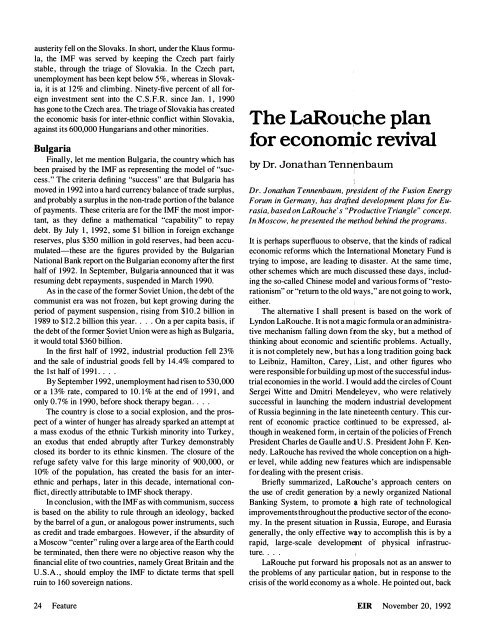Executive Intelligence Review, Volume 19, Number 46, November ...
Executive Intelligence Review, Volume 19, Number 46, November ...
Executive Intelligence Review, Volume 19, Number 46, November ...
You also want an ePaper? Increase the reach of your titles
YUMPU automatically turns print PDFs into web optimized ePapers that Google loves.
austerity fell on the Slovaks. In short, under the Klaus fornlUla,<br />
the IMF was served by keeping the Czech part fairly<br />
stable, through the triage of Slovakia. In the Czech part,<br />
unemployment has been kept below 5%, whereas in Slovakia,<br />
it is at 12% and climbing. Ninety-five percent of all foreign<br />
investment sent into the C.S.F.R. since Jan. 1, <strong>19</strong>90<br />
has gone to the Czech area. The triage of Slovakia has created<br />
the economic basis for inter-ethnic conflict within Slovakia,<br />
against its 600,000 Hungarians and other minorities.<br />
Bulgaria<br />
Finally, let me mention Bulgaria, the country which has<br />
been praised by the IMF as representing the model of "success."<br />
The criteria defining "success" are that Bulgaria has<br />
moved in <strong>19</strong>92 into a hard currency balance of trade surplus,<br />
and probably a surplus in the non-trade portion of the balance<br />
of payments. These criteria are for the IMF the most important,<br />
as they define a mathematical "capability" to repay<br />
debt. By July 1, <strong>19</strong>92, some $1 billion in foreign exchange<br />
reserves, plus $350 million in gold reserves, had been accumulated-these<br />
are the figures provided by the Bulgarian<br />
National Bank report on the Bulgarian economy after the first<br />
half of <strong>19</strong>92. In September, Bulgaria announced that it was<br />
resuming debt repayments, suspended in March <strong>19</strong>90.<br />
As in the case of the former Soviet Union, the debt of the<br />
communist era was not frozen, but kept growing during the<br />
period of payment suspension, rising from $10.2 billion in<br />
<strong>19</strong>89 to $12.2 billion this year . .. . On a per capita basis, if<br />
the debt of the former Soviet Union were as high as Bulgaria,<br />
it would total $360 billion.<br />
In the first half of <strong>19</strong>92, industrial production fell 23%<br />
and the sale of industrial goods fell by 14.4% compared to<br />
the 1st half of <strong>19</strong>91. . . .<br />
By September <strong>19</strong>92, unemployment had risen to 530,000<br />
or a 13% rate, compared to 10.1% at the end of <strong>19</strong>91, and<br />
only 0.7% in <strong>19</strong>90, before shock therapy began . .. .<br />
The country is close to a social explosion, and the prospect<br />
of a winter of hunger has already sparked an attempt at<br />
a mass exodus of the ethnic Turkish minority into Turkey,<br />
an exodus that ended abruptly after Turkey demonstrably<br />
closed its border to its ethnic kinsmen. The closure of the<br />
refuge safety valve for this large minority of 900,000, or<br />
10% of the popUlation, has created the basis for an interethnic<br />
and perhaps, later in this decade, international conflict,<br />
directly attributable to IMF shock therapy.<br />
In conclusion, with the IMF as with communism, success<br />
is based on the ability to rule through an ideology, backed<br />
by the barrel of a gun, or analogous power instruments, such .<br />
as credit and trade embargoes. However, if the absurdity of<br />
a Moscow "center" ruling over a large area of the Earth could<br />
be terminated, then there were no objective reason why the<br />
financial elite of two countries, namely Great Britain and the<br />
U.S.A., should employ the IMF to dictate terms that spell<br />
ruin to 160 sovereign nations.<br />
24 Feature<br />
The LaRouche plan<br />
for economic revival<br />
by Dr. Jonathan Tennrnbaum<br />
i<br />
Dr. Jonathan Tennenbaum, p�sident of the Fusion Energy<br />
Forum in Germany, has drafted development plans for Eurasia,<br />
based on LaRouche's "Productive Triangle" concept.<br />
In Moscow, he presented the m'f!thod behind the programs.<br />
It is perhaps superfluous to observe, that the kinds of radical<br />
economic reforms which the International Monetary Fund is<br />
trying to impose, are leading to disaster. At the same time,<br />
other schemes which are much piscussed these days, including<br />
the so-called Chinese model and various forms of "restorationism"<br />
or "return to the old ways," are not going to work,<br />
either.<br />
The alternative I shall pre$ent is based on the work of<br />
Lyndon LaRouche. It is not a magic formula or an administrative<br />
mechanism falling down ftom the sky, but a method of<br />
thinking about economic and s�ientific problems. Actually,<br />
it is not completely new, but has a long tradition going back<br />
to Leibniz, Hamilton, Carey , jList, and other figures who<br />
were responsible for building up most of the successful industrial<br />
economies in the world. I would add the circles of Count<br />
Sergei Witte and Dmitri Mendeleyev, who were relatively<br />
successful in launching the mqdern industrial development<br />
of Russia beginning in the late nineteenth century. This current<br />
of economic practice continued to be expressed, although<br />
in weakened form, in certain of the policies of French<br />
President Charles de Gaulle and U.S. President John F. Kennedy.<br />
LaRouche has revived the whole conception on a higher<br />
level, while adding new features which are indispensable<br />
for dealing with the present cris�s.<br />
Briefly summarized, LaR

















